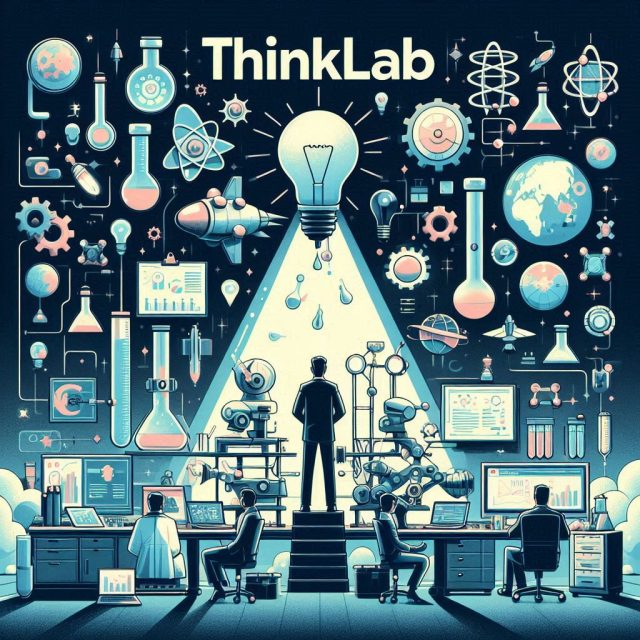In an era marked by rapid technological advancement and an increasingly complex global landscape, the roles of science and government are more crucial than ever. However, many challenges plague these domains, from funding disparities and bureaucratic inefficiencies to misinformation and public distrust. Recognizing these issues, Thinklab emerges as a forward-thinking initiative aimed at creating a startup team that addresses the systemic flaws in science and government. This article will delve into the vision behind Thinklab, its mission, the approach to building an effective startup team, and the potential impact it could have on the future of science and governance.
The Importance of Science and Government
1. The Role of Science
Science serves as the foundation for progress and innovation, driving advancements in medicine, technology, and environmental sustainability. It enables societies to understand the world better and make informed decisions. However, the scientific community faces challenges that hinder its effectiveness:
- Funding Disparities: Research often depends on grants, and funding is frequently allocated based on trends rather than need. This can lead to critical areas being overlooked.
- Reproducibility Crisis: Many scientific findings are difficult to replicate, raising questions about their validity and trustworthiness.
- Public Mistrust: Misinformation and sensationalism can erode public confidence in scientific findings, complicating communication between scientists and the public.
2. The Role of Government
Government institutions are responsible for creating policies that affect the lives of citizens, and they play a vital role in funding and regulating scientific research. However, governments often face their own set of challenges:
- Bureaucratic Inefficiencies: Complex regulations and slow decision-making processes can stifle innovation and hinder effective responses to emerging issues.
- Lack of Transparency: Citizens often feel disconnected from government processes, leading to distrust and apathy.
- Political Polarization: Science and policy discussions can become mired in partisan debates, making it difficult to reach consensus on important issues.
Innovating Solutions for a Smarter Tomorrow!
The Vision Behind Thinklab
Thinklab envisions a future where science and government work synergistically to tackle societal challenges. The initiative aims to create a startup team that leverages innovative approaches to enhance the effectiveness of both fields.
Core Objectives of Thinklab
- Promoting Evidence-Based Decision-Making: Thinklab seeks to bridge the gap between scientific research and policy decisions, ensuring that governance is informed by the best available evidence.
- Fostering Collaboration: By bringing together scientists, policymakers, and entrepreneurs, Thinklab aims to create a collaborative ecosystem that encourages interdisciplinary problem-solving.
- Enhancing Public Engagement: Engaging the public in scientific discussions and policy-making is essential for building trust and transparency. Thinklab prioritizes initiatives that facilitate this engagement.
- Innovating Solutions: The startup team will develop innovative tools and platforms to streamline scientific research and improve government processes, making them more efficient and accessible.
Building the Thinklab Team
Creating a successful startup team requires careful consideration of the skills, experiences, and motivations of its members. Thinklab recognizes the importance of assembling a diverse and dynamic team to achieve its goals.
1. Identifying Key Roles
To address the complexities of science and government, Thinklab must include a range of expertise. Key roles in the team may include:
- Data Scientists: Experts in data analysis who can help interpret research findings and translate them into actionable insights for policymakers.
- Policy Analysts: Individuals with experience in government who can navigate regulatory frameworks and advocate for evidence-based policies.
- Communications Specialists: Professionals skilled in public relations and outreach, responsible for engaging the public and conveying complex scientific concepts in accessible language.
- Software Developers: Tech-savvy individuals who can create innovative tools and platforms to support scientific research and government initiatives.
- Project Managers: Individuals adept at organizing and coordinating projects, ensuring that initiatives run smoothly and on schedule.
2. Fostering a Collaborative Culture
A successful startup team thrives on collaboration and open communication. Thinklab emphasizes the importance of cultivating a culture where team members feel comfortable sharing ideas, challenging assumptions, and brainstorming solutions together.
- Regular Brainstorming Sessions: Thinklab will hold regular meetings to encourage team members to share insights, discuss challenges, and generate innovative ideas.
- Cross-Disciplinary Workshops: Bringing together individuals from different backgrounds fosters creativity and encourages unique problem-solving approaches.
- Feedback Mechanisms: Establishing a system for continuous feedback helps the team identify areas for improvement and celebrate successes, creating a supportive environment.
Where Ideas Meet Action for Society’s Challenges!
3. Attracting Talent
To build a diverse and effective team, Thinklab must attract individuals who are passionate about science and government reform. Strategies for attracting talent include:
- Networking Events: Hosting events to connect with potential team members, showcasing the vision of Thinklab and its impact on society.
- Internship Programs: Offering internships can provide valuable experience to students and young professionals while allowing Thinklab to identify emerging talent.
- Collaboration with Universities: Partnering with academic institutions can help Thinklab tap into a pool of skilled graduates and researchers interested in social impact.
Innovative Approaches to Science and Governance
Thinklab will employ a range of innovative approaches to enhance the effectiveness of science and government. Here are some key strategies:
1. Leveraging Technology
In an age where technology drives progress, Thinklab will leverage digital tools to improve scientific research and government processes.
- Data Analytics Platforms: Developing user-friendly platforms that allow scientists to analyze and share data effectively, ensuring that research findings are readily available to policymakers.
- AI and Machine Learning: Utilizing artificial intelligence to predict trends, analyze complex datasets, and automate decision-making processes in both science and government.
- Public Engagement Tools: Creating digital platforms that facilitate public participation in scientific research and policy discussions, such as online forums and interactive data visualization tools.
2. Fostering Interdisciplinary Collaboration
Thinklab recognizes that addressing complex societal challenges requires input from diverse fields. The team will encourage collaboration between scientists, engineers, social scientists, and policy experts.
- Joint Research Initiatives: Launching research projects that bring together experts from various disciplines to tackle pressing issues, such as climate change, public health, and education reform.
- Advisory Panels: Establishing panels that include experts from academia, industry, and civil society to provide guidance on research priorities and policy decisions.
- Workshops and Conferences: Organizing events that bring together thought leaders and practitioners to share insights and foster collaboration.
3. Promoting Open Science
Transparency and accessibility are vital for rebuilding trust in science. Thinklab will advocate for open science practices that make research findings available to the public.
- Open Data Initiatives: Encouraging scientists to share their data openly, allowing for greater collaboration and verification of research findings.
- Publications in Open Access Journals: Supporting researchers in publishing their work in journals that are freely accessible, ensuring that knowledge reaches a broader audience.
- Citizen Science Projects: Involving the public in scientific research, enabling them to contribute data and observations while enhancing public understanding of science.
Building Partnerships
Thinklab understands that collaboration extends beyond its internal team. Building partnerships with external organizations, government agencies, and community stakeholders is essential for achieving its mission.
1. Collaborating with Nonprofits and NGOs
Partnerships with nonprofits and non-governmental organizations can enhance Thinklab’s reach and impact. These organizations often have valuable insights and resources that can complement Thinklab’s initiatives.
- Joint Advocacy Campaigns: Collaborating on campaigns that promote evidence-based policies, public engagement, and scientific literacy.
- Capacity Building: Offering training and resources to nonprofit organizations to help them leverage scientific research in their advocacy efforts.
2. Engaging Government Agencies
Thinklab aims to foster relationships with government agencies to facilitate knowledge exchange and collaboration.
- Policy Development Workshops: Organizing workshops with government officials to co-create policies that address pressing issues, ensuring that they are grounded in scientific evidence.
- Advisory Committees: Establishing committees that include representatives from Thinklab and government agencies to provide guidance on research priorities and policy decisions.
3. Involving the Private Sector
The private sector plays a significant role in scientific research and innovation. Building partnerships with businesses can enhance Thinklab’s initiatives and broaden its impact.
- Corporate Sponsorships: Securing sponsorships from businesses that share Thinklab’s vision and values, enabling the team to fund research projects and initiatives.
- Collaborative Research: Partnering with companies to conduct research that addresses industry challenges while benefiting society as a whole.
Reimagining Governance Through Scientific Insight!
Measuring Impact and Success
To ensure that Thinklab’s initiatives are effective, the team must develop a framework for measuring impact and success. This framework should include:
1. Defining Key Performance Indicators (KPIs)
Establishing clear KPIs will help Thinklab assess progress toward its objectives. KPIs may include:
- Number of Collaborations: Tracking the number of partnerships formed with academic institutions, nonprofits, and government agencies.
- Public Engagement Metrics: Measuring public participation in citizen science projects and outreach initiatives.
- Research Outputs: Evaluating the quantity and quality of research produced through Thinklab initiatives.
2. Conducting Regular Evaluations
Periodic evaluations will allow Thinklab to assess its impact and make necessary adjustments. These evaluations can include:
- Surveys and Feedback: Collecting feedback from team members, partners, and stakeholders to identify areas for improvement.
- Impact Assessments: Conducting assessments to evaluate the effectiveness of specific projects and initiatives.
3. Sharing Results
Transparency is essential for building trust and credibility. Thinklab will share its results and impact assessments with the public, stakeholders, and partners.
- Annual Reports: Publishing annual reports that outline achievements, challenges, and future goals.
- Public Presentations: Organizing events to present findings and insights, fostering dialogue and collaboration with the community.
The Future of Thinklab
As Thinklab embarks on its journey to revolutionize science and governance, several exciting possibilities lie ahead.
1. Scaling Operations
As the initiative gains traction, Thinklab may expand its operations to include additional regions or countries. This scaling could involve:
- Establishing Regional Hubs: Creating regional offices that focus on local challenges while leveraging the expertise of the central team.
- Collaborative Networks: Building networks of like-minded organizations and individuals to share knowledge and resources across borders.
2. Continuous Innovation
Innovation will remain a cornerstone of Thinklab’s approach. The team will continually explore new technologies, methodologies, and strategies to enhance its impact.
- Hackathons and Innovation Challenges: Organizing events that encourage participants to develop creative solutions to pressing challenges in science and government.
- Research and Development: Investing in R&D to create cutting-edge tools and platforms that support evidence-based decision-making.
3. Long-Term Sustainability
Ensuring the long-term sustainability of Thinklab’s initiatives will be essential for achieving lasting impact.
- Diversifying Funding Sources: Exploring various funding avenues, including grants, sponsorships, and crowdfunding, to support ongoing projects.
- Building a Strong Community: Cultivating a community of supporters, advocates, and stakeholders who share Thinklab’s vision and values.
Conclusion
Thinklab represents a bold vision for the future of science and government. By assembling a diverse and collaborative startup team, the initiative aims to address the systemic challenges that hinder progress in these critical fields. Through innovative approaches, strategic partnerships, and a commitment to transparency and engagement, Thinklab seeks to foster a new era of evidence-based decision-making and effective governance.
In a world that increasingly relies on scientific knowledge and effective policy, Thinklab’s mission is timely and essential. As the initiative takes shape, it has the potential to inspire positive change, build public trust, and ultimately contribute to a better-informed society. The journey of Thinklab is just beginning, and its impact could resonate for generations to come.





